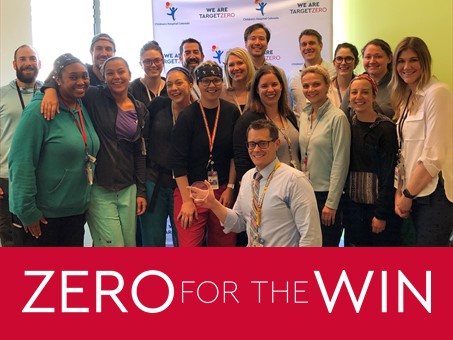Neuropsychiatric Special Care Unit Wins First-Ever We Are Target Zero Award
Children's Hospital of Colorado Jun 6, 2019
"That injury rate really caused our team to step back and think, 'What could we do to keep our team members safe?'" says Lyndsay Gaffey, MA, LPC and NSC Unit Manager.
One of the first steps Gaffey and the NSC team of mental health counselors, RNs, therapists, psychologists and psychiatrists took was to establish a core team and compare the practices of Children's Colorado to other institutions who lead the nation in reducing team member injuries in neuropsychiatric special care units.
By comparing practices, the NSC core team was able to isolate some actionable innovations that might drive a difference: increase the use of personal protection equipment (PPE), reduce the number of team members responding to an aggravated patient interaction and minimize the use of patient restraints in response to aggressive behavior.
While the increase in use of PPE seems intuitive, reducing the amount of team members responding to a patient in an aggravated state or decreasing restraint time might not.
"I view seclusion restraints as a traumatic event, for both team members and patients," explains Gaffey. "I think that over time, secluding and restraining patients takes a physical and psychological toll, not only on patients but on our team members too"
The new emphasis on hands-off de-escalating techniques decreased the amount of time NSC team members were in direct contact with patients during a conflict. NSC team members were able to prioritize their bodily safety over restraining a patient from damaging property.
"Before Safety-Care training, we had a culture of restraining patients for property destruction," explains Gaffey. "A table can be replaced, but you cannot. You and your mental well-being is not replaceable."
The approach took a multidisciplinary team to provide high-level training, clear scopes of services, individualized care, new PPE, new Safety Care plans and a retraining in the new changed model of care.
The results were astounding.
Instead of 20 days between OSHA-recordable events, the team went 609 days in late 2018, and instead of an average of 8 hours of patient restraint time a week, the team worked down to 46 minutes. The NSC patients have been responding well to the new approach, says the team.
"These are kids who come into our program highly aggressive and self-injurious and because of the hard work the team is doing, at the end of two- to three-week admission, they are able to comply with daily hygiene and school activities without physical restraint, says Patrick Romani, PhD, NSC psychologist.
"The parents are also empowered throughout the process and are able to carry out what they learn on the unit to create a safer home environment."
The NSC team has done a phenomenal job responding to the demands of far-reaching change in their approach to challenging situations and work culture, says Romani, who says each NSC team member prioritizes creating a therapeutic environment for their patients.
"I don't want to speak for everybody, but I feel safer," says Matt McCleary, a mental health counselor in the NSC. "I feel safer when we're not going into restraints frequently. I always feel less safe when we are going in and out of restraints."
Having witnessed some of the benefits of the work the NSC has collectively accomplished to protect team members and reduce patient restraints, McCleary looks forward to the team continuing to improve on the foundation laid. Every day the team meets to talk about what's going well or could be worked on.
On Thursday, May 30, Chief Operating Officer David Biggerstaff presented the NSC with the first We Are Target Zero Award on behalf of the organization. The award honors exemplary commitment to eliminating preventable harm, both to patients and team members.
Jason Williams, Director of Operations at the Pediatric Mental Health Institute (PMHI) says the NSC team members are deserving of the award – a one-of-a-kind team that personified creativity and a willingness to change for the better.
"This team possesses a true belief that these kiddos can get better and that we can do things differently," says Williams. "The staff have this remarkable ability to have a very difficult moment, be resilient, come back and say we are going to do this differently. And come back and be there for a patient population a lot of people don't understand."